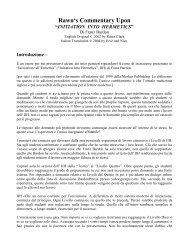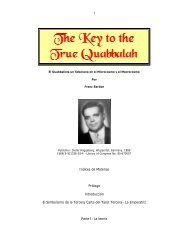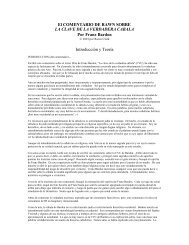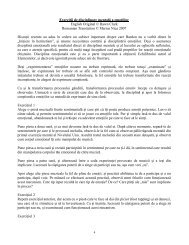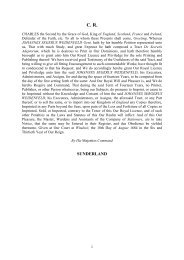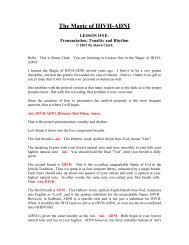Hermetic Philosophy and Alchemy - A Bardon Companion
Hermetic Philosophy and Alchemy - A Bardon Companion
Hermetic Philosophy and Alchemy - A Bardon Companion
You also want an ePaper? Increase the reach of your titles
YUMPU automatically turns print PDFs into web optimized ePapers that Google loves.
-whitens, rubifies, <strong>and</strong> makes itself to be both yellow <strong>and</strong> black; it unites with itself, conceives itself,<br />
<strong>and</strong> brings itself forth, to the full perfecting of its intention (13).<br />
It is only in her manifold changes that nature is known <strong>and</strong> made apparent in ordinary life; but, since<br />
these alchemists profess to have enjoyed another experience, <strong>and</strong> through their Art to have discovered<br />
her in her simple essentiality, to be that total which works all conditionedly throughout existence, it<br />
will therefore be requisite to consider their whole doctrine with reference to this presumed unity, <strong>and</strong><br />
by no means be led aside by their metaphoric language into a common misconstruction of its meaning;<br />
but since, according to the old maxim, All is in Mercury which the wise men seek, let us seek<br />
therefore if we may be able at all to identify this mercury, <strong>and</strong> whether the same ancient material be<br />
yet on earth,<br />
It is well known, that the Greeks <strong>and</strong> eastern sages derived all things in common from a certain pure<br />
<strong>and</strong> hidden fire; Stoics, Pythagoreans, Platonists, <strong>and</strong> Peripatetics view with each other in celebrating<br />
the occult virtues of the Ether; its all-pervading essence <strong>and</strong> perfective power: in it they place the<br />
providential regulation of nature; it was the very life <strong>and</strong> substance of their theosophy, in which from<br />
the highest to the lowest confines of existence, from Jove to the last link in the infernal monarchy, all<br />
were inhabiting the ethereal world; for, as Virgil says, it lights <strong>and</strong> nourishes the innermost earth as<br />
well as the air <strong>and</strong> starry heavens.<br />
Principio coelum, ac terras, composque liquentes,<br />
Lucentemque globum Lunae, Titaniaque astra,<br />
Spiritus intus alit; totamque infusa per artus<br />
Mens agitat molem, et magno se corpore miscet (14).<br />
And the assertions of the Ethnics, about the Anima Mundi, differ very little or nothing in substance<br />
from the Hebrew doctrine, but in words only; neither are their opinions so heinous or ridiculous as the<br />
zealous policy of ignorance, under a Christian guise, has too often caused them to appear. That there is<br />
a fluid or vitalizing principle invisibly permeating all things, <strong>and</strong> resident in the air we breathe,<br />
common experience indicates, for life cannot subsist without air, not in all kinds of air; but there is<br />
some one quality or ingredient in the atmosphere which is a secret food of life, <strong>and</strong> on which it<br />
immediately depends; what this aliment is, though many names have been invented, the moderns in<br />
default of knowledge are not agreed; <strong>and</strong> seeing it escapes the test of their closest vessels <strong>and</strong> analyses,<br />
<strong>and</strong> that it can be neither seen, heard, felt, nor naturally understood, the ancient theory of the One<br />
Element has been very much derided. The chemist, Homberg, indeed, with Boerhaave, Boyle, <strong>and</strong><br />
others eminent of that period, hold with the alchemists, that there is a distinct substance universally<br />
diffused, though sensible only in its mixed forms <strong>and</strong> powerful effects; that it is the alone pure <strong>and</strong><br />
active source of all things, <strong>and</strong> most firm bond of the natural elements, giving life to all bodies,<br />
penetrating <strong>and</strong> sustaining all things, <strong>and</strong> enlivening all; that this mighty Ether moreover is always at<br />
h<strong>and</strong>, ready to break forth into action on predisposed subjects; fermenting, producing, destroying, <strong>and</strong><br />
governing the total course of nature. Bishop Berkeley, too, in his Siris, contends learnedly in favor of<br />
the same universal material, which he likewise calls ether, <strong>and</strong> a pure invisible fire --- the most subtle<br />
<strong>and</strong> elastic of all bodies pervading all, <strong>and</strong> considers that it is from thence, <strong>and</strong> not from any mingled<br />
property, that the air has its power of sustenance <strong>and</strong> vitalization.<br />
These then, with a few others, in recent times have so far concurred with the ancients in distinguishing<br />
the fontal Spirit of nature, apart from its manifestation, <strong>and</strong> as distinct from that elementary ignition<br />
with which we are sensibly familiar; for they do not allow that to be fire indeed, but an excitation only<br />
or effect of the antecedent potency which they describe. But then they could adduce no tangible proof<br />
of their doctrine. The worked could not see their invisible fire. It has therefore been regarded as a mere<br />
speculative chimera (which in part it was perhaps, in their minds, without experience), <strong>and</strong>,<br />
accordingly, disbelieved. For philosophy, at length, laudably anxious to prove all things, yet too idle to<br />
theorize, will suppose nothing that is not openly shown; how then should she recognize that recondite<br />
fire?



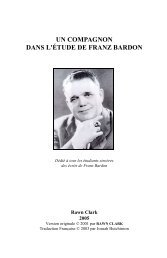
![Magie de YHVH-ADNY et Archeus[1]](https://img.yumpu.com/16926522/1/190x245/magie-de-yhvh-adny-et-archeus1.jpg?quality=85)
